The Novak Guide to the
Dana Spicer Model 18 Transfer Case
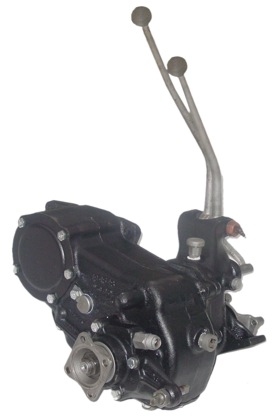 The Dana 18 is found in 1940-1971 Jeep vehicles. It is also found in IH Scout trucks. It's production spanned 30 successful years, making it one of the most famous and recognizable transfer cases of all time.
The Dana 18 is found in 1940-1971 Jeep vehicles. It is also found in IH Scout trucks. It's production spanned 30 successful years, making it one of the most famous and recognizable transfer cases of all time.
History
This is a difficult section to abbreviate, so hold on...
It is absolutely fair to say that the most important part of one of the most important vehicles of the last century is the transfer case. If World War II was won by the "Jeep", than it was won by the gearbox that gave the Jeep four-wheel-drive - the Dana Spicer 18.
The distinction of the invention of the first four-wheel-drive truck may go to the Brookford, Pennsylvania Twyford Company in 1905, though built only in extremely limited numbers. A Wisconsin company named Four-Wheel-Drive would later produce 4wd trucks for the US and UK armed forces for WWI. Marmon-Herrington later made 4wd conversions for Ford trucks and their own heavy commercial and military applications of 4wd technology. Before 1940, not Ford, nor GM nor Dodge had a production four-wheel-drive offering.
The first Dana 18's by Ford and Bantam were actually driver's side drop models. The Willys model was essentially identical but a passenger side drop, which would become the Jeep standard format until 1986.
Then arrived 1940. War was on in Europe and looming for the US. Forward thinking military brass rapidly comissioned the construction of a light utility vehicle. Bantam, Willys & Ford competed (listed in descending order of success and in ascending order of these companies' long-term economic success) for the contract.
Despite this break-neck, accelerated wartime development, the Dana Spicer 18 transfer case was a total success and a pivotal development in the history of the Jeep and all subsequent four-wheel drive trucks. The Willys MB and Ford GPW Jeeps were the first, full production four-wheel drive vehicles.
Identification
The Dana 18 is the only cast iron, offset drive (meaning that both front and rear driveshafts are in-line) transfer case found in production Jeeps.
The earliest Dana 18's in the Bantam and first GPW's were driver's drop. For the purpose of standardization across the GPW & MB line for parts interchageability, they were changed to passenger drop. These and all subsequent 18's had a passenger side rear output that is often coupled with a drum brake assembly. The front output is also on the passenger side.
Features
This transfer case is compact, light, durable, simple to build and capable. It features dual modes (2wd + 4wd) and dual ranges (Hi + Lo).

A view of the input gear as seen through the PTO port. Removal of this gear through the back of the case is required for removal from the transmission, unless you have the 4" input bore version of the 18, in which case the gear will slip through the front.
The center rear portion of the 18 offers a capable PTO port and what would later become an aftermarket overdrive port. This port is otherwise and most commonly sealed off by a stamped steel plate.
The front input flange is shaped like Texas, backwards and uses five 3/8" mounting bolts through to the transmission. The front output yoke is a 1310 and the rear output yoke is a flanged style. A Spicer #2-4-2851X yoke can replace this rear flanged yoke. The output shafts are 10 splines.
There is an interlock pin between the shifter rails. Removal of this interlock allows for the added function of 2wd/Low to the 18 - if you have the "twin-stick" version (see below) of the 18.
The Dana 18's offset design offers an advantage over all other center-drive transfer cases, in that the axle pumpkins and transfer case drop are all inline with each other and on one side of the Jeeps undercarriage - permitting the driver to pick a driving line to more easily clear boulders and other trail obstacles.
Shift Pattern
For the twin-stick Dana 18, the lever closest to the driver (left hand drive models) disengages the front axle in the forward mode, and engages the front axle in the rear mode. The passenger side stick is up for low range, center for neutral and down for high range.
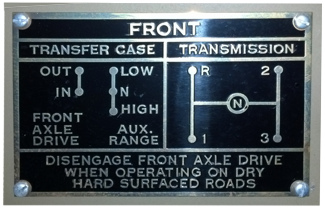
The shift pattern plate as found in a Bantam Jeep.
Single-stick 18's as found in the factory Buick V6 Jeeps featured a single stick that is 2wd High when fully forward, 4wd High, Neutral and 4wd Low, front to back, respectively.
Jeeps that had the Spicer 18:
- Bantam BRC
- Willys MA & MB
- Ford Pygmy & GPW
- Willys or Kaiser Willys
- CJ2, CJ2A, CJ3A, CJ3B, M38, M38A1, CJ5, CJ6, FC, Utility Trucks & Wagons
Versions
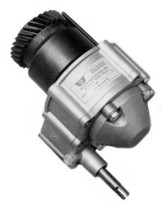 The Warn overdrive is a clever, classic and famous Dana 18 add-on offered during the 1960's and early 1970's. It was available on the aftermarket, originally, and then later as a dealer item also. Husky and Dual-Matic were similar knock-offs during this same era.
The Warn overdrive is a clever, classic and famous Dana 18 add-on offered during the 1960's and early 1970's. It was available on the aftermarket, originally, and then later as a dealer item also. Husky and Dual-Matic were similar knock-offs during this same era. What's more, some of these overdrives even had a PTO adapter available for those who needed the best of all worlds.
There are four major styles of the Model 18.
Early Military, 1941-1945
Military versions of the 18 built for the MB & GPW wartime Jeeps have a 1.97:1 ratio low range and a 1:1 high range. These early versions featured a 3/4" diameter intermediate idler shaft and dual shifters. These transfer cases were only married to the Borg Warner T84 three speed transmission and had a 3-5/32" input locating bore.
Early Civilian, 1945-1946
A handful of the earliest civilian Dana 18's that were married to the side-shift version of the T90 feature 2.43:1 low range and have a 3/4" intermediate shaft. Relatively few examples of these exist but the reader should be aware of it. They were developed for the prototype 6x6 Tugs (only 16 of these were made). This transfer case came in the preproduction 1944 CJ-1 and 1944-1945 CJ-2 and were installed in the CJ2A up through serial number CJ2A-24196.
Mid Civilian, 1946-1955
With military restrictions freed up and Willys eyeing the civilian, utility and agricultural markets, the Dana 18 was improved with a lower 2.46:1 low range gear ratio. The intermediate idler shaft was increased to 1-1/8", using caged needle roller bearings. The rear PTO port began to see serious use as a driver of accessories ranging from pumps, winches, generators, farm implements, etc. The locator bore continued to be the 3-5/32" diameter. Casting numbers of C18-15-10 have been seen on these versions.
Later Civilian, 1955-1971
In 1955 (this varies by a year or so on some models; no doubt while Willys-Overland was using up its remaining inventory) Jeeps received the Dana 18 with an 1-1/4" intermediate shaft. This improvement was not intended to increase the shear strength of the pin, but to increase the bearing area and the number of bearings. Free needle rollers, then, replaced the earlier and significantly fewer caged needle rollers. The locator bore continued to be the 3-5/32" diameter.
Final Civilian, 1966-1971
The "large case" version of the Dana 18 was the most improved version of all. It was only found behind the Buick V6 engine with its T86 and T14 transmissions. The case casting used was that from the Dana 18's progenitor, the Dana Spicer Model 20. This case featured a 4" locating bore and a single stick shifter and new front output cap. The front output assembly did not provision for a shifter mounting point, as the shifter was anchored to a transmission bracket. The internals were essentially identical with the standard Dana 18. This version is best thought of as Dana 18 guts in a Dana 20 shell. Individuals can build a "Super 18" by copying this version.
Strength
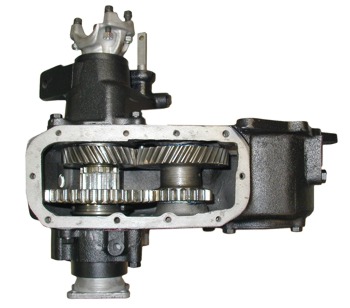
Fat gears in a little case... the underside of a Model 18 showing the front helical set of gears, and the rear set of spur gears.
It is nearly remarkable how much power this compact transfer case can transmit and sustain. It is not so rare to see them handling Big Block grade power and deep, compound gearing.
The 18 is not without a fuse when under extreme service; its offset design causes the reactive driven torque of the driveshafts to apply a large upward moment force against the case and the case can split between the intermediate shaft bore and the PTO port or the case bottom opening. Gears (as with any gearbox) may break under some outstanding circumstances. Also, the forces of the front helical gearset are not captured and balanced by the rear spur gearset, causing these forces to be applied against the case, which may stretch it to a failure point. However, these situations are quite rare and essentially non-issues for the appropriate driver, Jeep and terrain.
The "large case" 18 is the stronger of the lot, though not dramatically so. Its case casting was improved in both engineering terms and in is method of casting.

Rebuilding
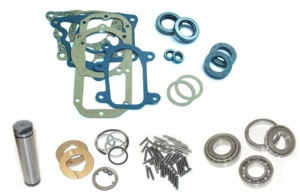 A benchtop rebuild of a Dana 18 is doable and possibly even enjoyable by the shadetree mechanic or experienced technician. Parts are readily available both new and salvaged, along with standard rebuild kits that address the common wear points.
A benchtop rebuild of a Dana 18 is doable and possibly even enjoyable by the shadetree mechanic or experienced technician. Parts are readily available both new and salvaged, along with standard rebuild kits that address the common wear points.
Our classic rebuild guide is found here and offers an indication as to the tools and techniques involved.
Our parts, which include a specially hardened intermediate shaft, are always available and kits have been configured to address the wear points and upgrade where possible. Gears and other components remain largely available and in production. Ask us if you require something not seen in our catalog.

Because the Dana 18 is a side-drive type transfer case, the intermediate gear is under not only constant spin, but constant load.
Above is an original Dana 18 intermediate shaft showing a fascinating and classic wear pattern. The bearing surfaces are evident and generally exhibit normal wear. However, note the flaked section at the front portion of the shaft, showing how the gear attempts to tilt, creating localized wear due to alignment variation.
This is a factory Dana shaft, which were generally made of decent steel. Nearly all aftermarket intermediate shafts costing anything less that $40. are made of unsuitable alloys and processes - what JP Magazine's John Cappa once called "rebar". Novak shafts "turn it up to 11", seeking hardness levels of 62RC to a deep case depth attainable in a triple alloyed gear steel.
We hear back from many customers having installed our shafts and they claim quieter running transfer cases and dramatically longer wear times.
Individuals that have 1-1/8" shaft transfer cases should know that their cases can be precision line bored to accept 1-1/4" intermediate shafts and their larger contingent of bearings, resulting in quieter operation and longer gear bore, shaft journal and needle bearing life. This is a service that Novak provides on request. Cost is $191.25. Contact us.
Components
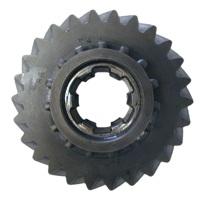 Nearly all parts remain available for the Spicer 18.
Nearly all parts remain available for the Spicer 18.
A variety of gear cuts, spline counts and tooth counts in the Dana 18 gears existed. Anyone wanting to check for gear replacement and interchange will benefit from this chart. Mixing the wrong parts will cause substantial mechanical grief.
Transmission Compatibility & Adaptability
- T84, 1941-1945
- T90, 1945-1971
- T98, 1955-1971
- T86, 1966-1971
- T14, 1966-1971
The Jeep Spicer 18 is found behind these factory manual transmissions, left:
Adaptation to better transmissions is often less costly than rebuilding the weaker Jeep gearboxes and provides serious performance and strength upgrades. The Model 18 adapts very well to several popular transmissions, including:
Manuals
 |
 |
 |
 |
| SM420 | SM465 | T18 | NP435 |
Automatics
 |
 |
 |
| TH350 | TH400 | TH700R4 / Early 4L60-E |
The Dana 18 makes for a great replacement transfer case for the Borg Warner 1339 Quadra Trac transfer case as found behind the TH400 in 1973 to 1979 Wagoneer and Cherokee "FSJ" Jeeps. It has the same offset and drop, allowing for the retention of the front and rear axles. The strength of the Dana 18 if properly maintained is adequate for even the heavier Jeeps and their V8's. Our #124 kit makes this upgrade possible with the factory TH400.
Interchangeability
Because of the intermediate shaft size of 1-1/4" on the later transfer cases case, the MB/GPW case must be machined to this size to accept this larger shaft.
Generally speaking, all Model 18 transfer cases are interchangeable as a unit. The proper input gear must be used for the transfer cases case being used. Match up holes in gaskets with the transmission and transfer case when using stock Jeep transmission as these sometimes differ and may cause loss of lubricant from the transmission into the transfer case.
MB and GPW Jeeps can be upgraded with T90 transmissions, which are superior to the original T84. T90's have larger diameter cluster and reverse idler shafts that are spaced further apart than on the T84. The clearance pocket on the mating face of the transfer case must be opened up to accommodate these larger shafts with a rotary file in a drill motor using a T90 gasket as a template.
The Dana 18 can be replaced by a Dana 20, but only with some work. Some individuals may wish to do so for the quieter, direct-drive, or to use a centered axle. We don't believe that this change is desirable, overall. The Model 20 has a higher and longer output section, and even if switching to a centered axle, this creates unnecessary u-joint strain in early CJ Jeeps. Also, one loses the very useful ability to overcome some trail obstacles by biasing the Jeep's underside somewhat right, as clearance is better with both axles offset towards the passenger side. Also, the Dana 18's native 2.46:1 low ratio is better than that of the Model 20, at 2.03:1.

Measuring the intermediate shaft diameter. This one is 1-1/8".
It is best to run a Dana 18 with good gears, bearings and shafts for optimal quietness and service than to change, in most situations.
| Drive Gear | Driven Gear |
| 447331 | 448494 |
| 447331 | 448493 |
| 447021 | 448110 |
| ? | 448316 |
| 447021 | 448361 |
| 447096 | 448153 |
| 44745? | 448701 |
If you have any contributions of knowledge to make to this list, please contact us and we'll make any additions or corrections.
Unfortunately, Novak doesn't have new or used speedometer parts for sale. They have become rarer than we'd like. Perhaps at some future date, we or others in the market will manufacture them and make them available.
Conclusion
Not only is the Dana 18 a great gearbox, but an amazing bit of history. Its design (like the rest of the early Jeeps) was mimicked by Rover, Toyota and others. It remains a very valid transfer case and respected by its owners and used in a great variety of mild to punishing situations.
Sources
- The Novak files and its many customer contributions
- Willie Worthy





